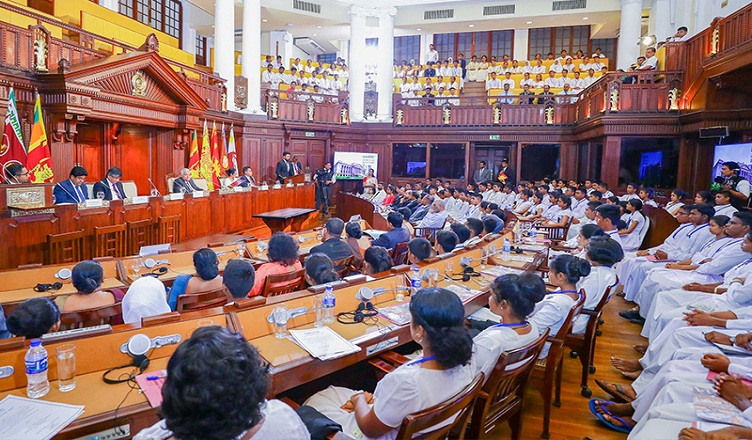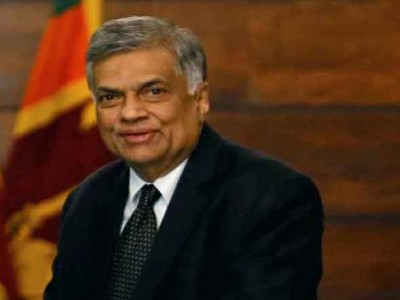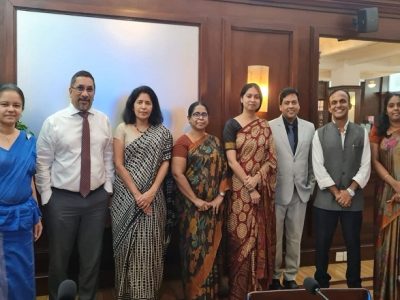(LANKAPUVATH | COLOMBO) – President Ranil Wickremesinghe emphasized that Sri Lanka stands out as the sole nation in Asia where democracy is fully safeguarded, ensuring that governmental actions do not impede the operations of the opposition.
The President also underscored the significance of safeguarding the democratic parliamentary system, ensuring that everyone’s viewpoints are afforded an opportunity to be heard.
President Ranil Wickremesinghe delivered these remarks while speaking at the opening session of Sri Lanka’s inaugural National Student Parliament, convened yesterday (26) at the Presidential Secretariat.
The National Student Parliament comprises two representatives elected from each of the zonal student parliaments established in 100 regions, spanning across the nine provinces of the island, selected based on receiving the highest number of votes.
In an election conducted yesterday (26) by the Election Commission under the auspices of the Co-curricular Guidance and Counselling Branch of the Ministry of Education, the National Student Parliament appointed individuals to various positions, including Speaker, Prime Minister, Deputy Speaker, 10 Ministers, and 10 Deputy Ministers.
The book titled ‘Pibidunu Sisu Mathi Sabaya,’ which chronicles the program offering school students the chance to visit notable locations in Colombo, including the President’s Office, conceived under the initiative of President Ranil Wickremesinghe, was presented to the President by Major Nadika Dangolla, Assistant Director of the Presidential Secretariat. Additionally, to commemorate this event, Mrs. Wasantha Perera, Secretary of the Ministry of Education, presented a special gift to President Ranil Wickremesinghe.
The President extended an invitation to the National Student Parliamentarians to share their viewpoints and recommendations regarding the nation’s political landscape. Additionally, he granted them the chance to visit the Cabinet meeting venue at the Presidential Secretariat.
The Secretary to the President Saman Ekanayake, distributed certificates to the members of the National Student Parliament.
Speaking at the National Student Parliament, President Ranil Wickremesinghe expressed:
“It is a pleasure to meet all of you who have convened for the inaugural session of Sri Lanka’s first National Student Parliament.
Sri Lanka stands out as a nation that has safeguarded democracy completely, making us unique. Democracy in our country evolved gradually during the colonial era. The establishment of the Legislative Assembly in 1833 marked a significant milestone, although no voting took place on that occasion. Instead, the governor appointed several Sri Lankans for the assembly. It wasn’t until 1912 that a Sri Lankan was given the chance to elect a Member of Parliament. However, women were not granted voting rights at that time. Approximately five thousand individuals, primarily based on property and education, were eligible to vote.
In 1931, Sri Lanka achieved universal suffrage, making history as the first country in Asia where both men and women over the age of 21 were granted the right to vote. Since then, Sri Lanka remains the sole Asian nation where the ruling party has not suppressed the opposition. While facing criticism and challenges, we have upheld democracy despite various shortcomings.
Subsequently, under the Donamore system, Sri Lanka acquired seven ministerial roles, three ministries were initially held by English. Over time, Sri Lankans assumed these positions. The council also appointed seven committees, each with its chairperson, functioning akin to ministries. Notably, political parties were absent during this period. Amidst World War conditions, all non-military affairs were delegated to Sri Lanka as it engaged with Britain, America, and the Soviet Union.
Following the Solebury Constitution, we attained freedom. The very building you are currently in was constructed for the convening of the Constituent Assembly. Subsequently, the Donmore Commission was convened within these premises, later re-established as the People’s Council. Both the Senate and the House of Commons were also housed in this location.
Upon Sri Lanka’s transition to a republic in 1972, this institution evolved into the National State Council. In 1977, I commenced my tenure in the National Assembly. Four individuals who served in the National Assembly remain active members of Parliament to this day. Former President Mahinda Rajapaksa and Mr. Vasudeva Nanayakkara were elected in 1970, while Mr. R. Sampanthan and I also entered Parliament in 1977. The year 1977 marked the country’s adoption of the executive presidential system. Subsequently, following our relocation to the new Parliament premises in 1982, this edifice was repurposed as the President’s Office.
Despite the backdrop of world wars and internal conflicts, Sri Lanka has steadfastly preserved its democratic values, ensuring the functioning of both the government and the opposition without interruption. This approach has facilitated the expression of diverse viewpoints, underscoring the importance of safeguarding our parliamentary system.
Only two countries in the entirety of Asia and Africa have achieved this feat: Sri Lanka and Mauritius. Given this, it is imperative that we all unite to safeguard this achievement. In Europe, only Great Britain, Ireland, Switzerland, and Sweden have consistently upheld democracy. The majority of countries that now advocate for democracy fell under the rule of Adolf Hitler.
You might find it worthwhile to explore methods for sustaining this system. Moreover, there could be individuals here with a keen interest in politics. I am confident that the National Student Parliament will serve as a foundation for nurturing such interests.
Following are the remarks by National Student Parliamentarians:
- Hon. President, in our country, the issue does not lie in the methodology, as you rightly pointed out. Sri Lanka stands as a beacon of democracy, with 100% universal suffrage. However, the challenge lies in the political awareness of our people. Many citizens lack understanding regarding the significance of voting preferences and the criteria for selecting candidates. We propose a solution to address this gap. Unlike in Europe, where political education is extensively provided from the age of 15, Sri Lanka offers limited exposure to political science only at the high school level. Consequently, our populace lacks the necessary political consciousness. Therefore, I believe that to address this fundamental issue, we must prioritize the cultivation of political awareness among our citizens. Once we elevate their political consciousness, we can move closer to achieving our ultimate goal of exercising universal suffrage and democratic rights within the current framework.
- Hon. President, from my perspective, I believe that adopting an education system similar to those in other countries could significantly alter our current situation. Rather than adhering strictly to conventional textbooks, we can instil critical thinking skills through co-curricular and extracurricular activities. What we require is an educational framework that inspires individuals to envision themselves contributing to Sri Lanka’s advancement on a global scale, encouraging them to remain in the country after completing their studies, rather than seeking opportunities abroad.
- Hon. President, I believe that political parties are essential in our country. However, in my view, there is no necessity for a plethora of political parties. It is more beneficial for us to align ourselves with a political party that aligns with our values and aspirations, one that prioritizes democratic principles and respects all individuals. By joining a party that embodies these ideals, we can strive for success together. Sri Lanka is a nation endowed with beauty and progress, and it is imperative that we work towards its continued development.
- Hon. President, coming from a humble village background, it has been a monumental dream for me to have the opportunity to meet and converse with you directly like this. Renowned philosophers have often emphasized that education serves as the primary instrument for transforming the world. It is evident that the current state of our country is largely influenced by the state of our education system. The very essence of the word “school,” derived from the Latin term “scola,” implies a place where a child finds utmost joy. However, many of us, including myself, can attest to the pressures we experience within our educational institutions. There is an urgent need for educational reforms akin to those implemented in developed nations. Together, as a nation, we have the capability to enact such changes. United, there is no challenge too great for us to overcome.
- Hon. President, our current education system is heavily focused on exams. I believe that transitioning towards a job-cantered education approach could alleviate many of the challenges we face. Often, the knowledge we acquire may not align with the demands of the job market, leaving us uncertain about our future prospects. Therefore, I propose a shift in our education system to better align with the needs of the job market.
Chief of Staff and Deputy General Secretary of the Parliament of Sri Lanka, Chaminda Kularatne, Assistant Secretary General of the Parliament of Sri Lanka, Hansa Abeyratne, Additional Secretary to the Prime Minister, Harsha Wijewardena, former Chairman of the Election Commission, Mahinda Deshapriya, along with Additional Secretaries, Provincial Secretaries, Principals, and teachers were present at this event.



